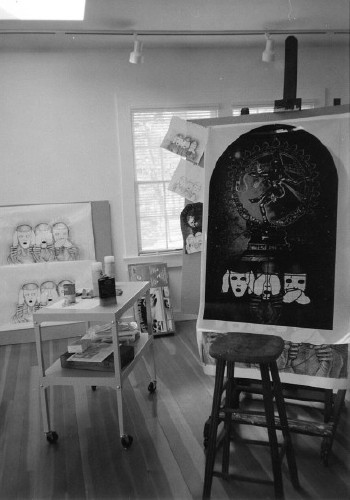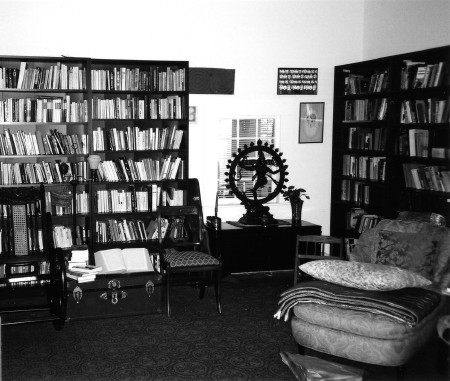The Multidisciplinary Fellowship
Mission Statement

OUTSIDERS
INSIDE
Each one of us is completely unique, different from everyone else; and each one of us wants to be accepted for who we are. Yet we enter into groups – families, circles of friends, associations of colleagues – in which some parts of ourselves are valued and others are ridiculed or disparaged. We reveal to others in the group those parts that they approve, and conceal the parts they disapprove. So we each feel like outsiders to some degree in every group we are in; and each person in the group carries that same burden of difference alone, not realizing that everyone else in the group does, too. The quality and dimensions of our difference change with the particular groups we are in, ensuring that we always violate the defined boundaries of the group and feel like outsiders in some respect, in virtually any such group.
Sometimes we try to conceal our difference by deflecting attention onto another, publicly designated “outsider” who personifies it. But this merely reinforces our hypocritical conformity to norms we know are wrong, represses our individuality, and sacrifices the acceptance of it we seek.
Yet being “outsiders” in this way defines, sharpens and strengthens the self, building important skills of survival that we often also conceal: skills of detachment, rationality, critical thinking, humor, humility, self-reflection, self-sufficiency, creative self-expression, tact, sensitivity, flexibility, self-control, communication and negotiation among them. The smaller the world becomes and the more diverse our social groups become, the more we need these skills in order to adjust to globalization and cross-cultural exchange. How can we best identify, study, develop and teach these multidisciplinary skills to others? How can we share them with one another to our collective benefit, without risking the painful collective rejections that made us conceal them in the first place? How can we adapt them to the new and challenging cultural contexts that increasingly confront us, and utilize them them on others’ behalf?
Our first task must be a scholarly one: to clarify what these skills are and analyze the ways in which they function within the self as strategies of survival and flourishing in a global environment. To do this much, the APRA Foundation seeks to fund an annual Multidisciplinary Fellow who has done enough of the hard work of self-clarification and self-analysis in order to protect, cultivate and successfully express these skills in divergent scholarly and/or artistic contexts; and to perceive on a personal level the broader social benefits of making them available to the general public in scholarly and/or artistic form.
1. The APRA Foundation Multidisciplinary Fellowship aims to promote
research on the conception, constitution and structure of the
self, with the educational goals of (i) increasing knowledge and public
awareness of individual and societal strategies for surviving and
flourishing in a global environment; and (ii) discovering, identifying and
promoting the cross-disciplinary and cross-cultural flexibility through
which these strategies are expressed.
2. The research topic of the conception, constitution and structure of the self includes but is not limited to
2.1. the relation among intuition, emotion, and reason in the self;
2.2. the relationship among logic, rationality and scientific method;
2.3. intrapersonal consistency in action through time;
2.4. the relation between individual and societal conceptions of the person;
2.5. the tensions and conflicts between individual and societal needs, obligations and expectations;
2.6. individual and societal memory and moral responsibility;
2.7. the interpersonal and institutional dynamics of xenophobia;
2.8. difference, anomaly and originality in the natural and social sciences;
2.9. the psychology of bodily, social and geographical boundary-violation;
2.10. the function of social transgression in defining individuals and enhancing social cohesion;
2.11. methods and procedures of self-investigation in Vedic and Western psychology;
2.12. comparative conceptions of the self in Vedic and Western philosophy;
2.13. constructions of the self through personal narrative and/or social mythology;
2.14. the interpersonal (familial, communal, social, political) dynamics of self-respect, self-worth, self-confidence, and/or self-regard;
2.15. the construction of and preconditions for personal identity.
 3. Individual and societal strategies for surviving and flourishing in a
global environment include but are not limited to self-mastery; mastery of
local conventions, practices and standards in diverse communities;
overachievement; passing and self-concealment; voluntary self-disclosure;
public self-identification; social self-stereotyping; psychological
self-analysis; cultural self-creation; artistic self-expression; ethical
self-sacrifice; selfless service; political self-assertion; social
self-abnegation; tactical self-camouflage; scapegoating; self-bifurcation or
compartmentalization; spiritual self-transcendence; conformist or
nonconformist self-presentation; and cross-community mediation,
translation, negotiation, organization, leadership and/or
conflict-resolution.
3. Individual and societal strategies for surviving and flourishing in a
global environment include but are not limited to self-mastery; mastery of
local conventions, practices and standards in diverse communities;
overachievement; passing and self-concealment; voluntary self-disclosure;
public self-identification; social self-stereotyping; psychological
self-analysis; cultural self-creation; artistic self-expression; ethical
self-sacrifice; selfless service; political self-assertion; social
self-abnegation; tactical self-camouflage; scapegoating; self-bifurcation or
compartmentalization; spiritual self-transcendence; conformist or
nonconformist self-presentation; and cross-community mediation,
translation, negotiation, organization, leadership and/or
conflict-resolution.
4.Cross-disciplinary and cross-cultural flexibility means successful
cross-cultural travel, transmission, navigation and/or collaboration. Each
one of us is required to cross cultures and/or disciplines, when we
interact with others outside our own areas of expertise. The resulting
experience develops dynamic cognitive and practical skills, as well as
capacities of breadth, flexibility and insight, that cannot be acquired any
other way. Hence each one of us needs some such strategies at various
points in our lives. For example, these strategies are useful and important
for Germany, in which the very same forces of globalization that have made
possible its reunification simultaneously threaten and infiltrate the
geographical and cultural boundaries by which it attempts to define itself
as a nation. Increased awareness of these strategies, and their historical
antecedents, thus has practical application to Germany’s ability to
successfully address issues of immigration, xenophobia, social and
organizational flexibility, and economic efficiency. But the urgency of
educating the general public about these issues is to be felt as well in
the United States, India, China and the rest of Europe.
Fellowship Application Guidelines
5. Conducting research on the conception, constitution and structure of the
self means formulating and carrying out a research project that results in
a book, article, essay, artwork, musical composition, poem, novel,
exhibition, symposium, performance, film, television program, and/or other
scholarly and/or creative final product, intended to educate the general
public about 3 and 4 above.
6. The APRA Foundation Multidisciplinary Fellowship is a single, annual competitive research grant designed for intellectuals who (i) are proven high achievers in at least two seemingly disparate fields of scholarship and/or the arts simultaneously; and (ii) wish to use the APRA Foundation’s resources to research the conception, constitution and/or structure of the self in either or both of them.
6.1. Single means that only one APRA Foundation Multidisciplinary Fellowship is granted each year.
6.2. Competitive means that the Fellowship is awarded annually to a specific individual based on criteria of exceptional scholarly and creative excellence and achievement in the seemingly disparate fields in question.
6.3. Research Grant means that this Fellowship carries all of the rights
and responsibilities of a traditional academic research grant that promotes
research in a particular field. Its rights include conducting professional
 research on the conception, constitution and/or structure of the self, with
the aid of the resources placed at the Fellow’s disposal by APRA. Its
responsibilities include meeting measurable professional
standards of quality, competence and productivity in the final work
produced.
research on the conception, constitution and/or structure of the self, with
the aid of the resources placed at the Fellow’s disposal by APRA. Its
responsibilities include meeting measurable professional
standards of quality, competence and productivity in the final work
produced.
6.4. Intellectuals means that
6.4.1. APRA Foundation Multidisciplinary Fellows are not restricted to those who hold advanced academic degrees, provided that their achievements meet the highest standards of excellence and outstanding contribution in their chosen fields;
6.4.2. APRA Foundation Multidisciplinary Fellows are required to show demonstrated proficiency in written or oral discursive (including both narrative and analytical) prose, even if neither of their seemingly disparate fields of scholarship and/or the arts require it. An example would be a mathematical logician and performance artist whose first-mentioned field involves the manipulation of algebraic symbols while the second involves the manipulation of sound, materials, and physical movement. Such an individual would still have to meet the requirement of demonstrated proficiency in written or oral discursive prose; for example, a lecture on their work process, an editorial on a topic of importance to them, an autobiographical or fictional narrative, or a public dialogue on some more abstract topic. Demonstrated proficiency means that the lecture, editorial, narrative or dialogue has been disseminated in the public sphere, either in print or performance.
6.5. Seemingly disparate fields of scholarship and/or the arts means a simultaneous combination of at least two specialized fields, of scholarly research and/or of artistic production, that does not fit comfortably into existing academic fields, programs, or interdisciplinary studies departments in today’s universities and colleges. Two fields are seemingly disparate if there is no overlap between them; i.e., if most specialists in one either know nothing about the other, or view it with indifference, incomprehension, or active hostility. Examples would include analytic philosophy and contemporary art, medicine and poetry, law and contemporary music composition, or neurobiology and avant-garde theatre. Excluded from seemingly disparate fields are:
6.5.1. a single area of research and/or creative work that falls into two different traditional fields, as does comparative literature into English and creative writing;
6.5.2. two separate areas of research and/or creative work, both of which involve the same type of labor, as do mathematics and statistical research or poetry and philosophy;
6.5.3. research and/or creative work in one field that is viewed as mutually complementary with that in the other by one’s colleagues in both – as would be true of engineering and architectural design, or composition and music criticism;
6.5.4. research and/or creative work in one field combined with performance of other artists’ work in another, for example theoretical physics research plus classical violin performance or documentary film-making plus acting.
6.5.5. research and/or creative work in one field superceded by research and/or creative work in another, for example early-career groundbreaking work in chemistry followed by mature groundbreaking work in art.
The APRA Foundation Multidisciplinary Fellowship seeks to identify, honor, support and nurture the unusual combination of boundary-crossing resourcefulness, creative independence and personal mettle that simultaneous but non-overlapping fields of specialization force successful practitioners to develop.

7. A successfully completed APRA Foundation Multidisciplinary Fellowship research
project
educates and familiarizes the general public with some of
the ways in which cross-disciplinary and cross-cultural boundary-crossing
enhances the development of tactics, skills, resources and knowledge
essential to all of us for adapting to a rapidly evolving global culture.
8. Applications for the APRA Foundation Multidisciplinary Fellowship should include, in PDF format,
(i) a 500-word description of the project and projected timetable for the various stages of its completion;
(ii) a current Curriculum Vitae including complete street and email addresses; and
(iii) the names and complete street and email addresses for four recommenders, two in each of the applicant's fields of specialization in scholarship and/or the arts respectively.
The application should also include the following supporting materials as appropriate to the disciplines involved:
(iv) two recent publications; and/or
(v) digital media documentation in JPEG format (for images), MP4 format (for video), and/or MP3 format (for audio).
These materials cannot be returned. They should be submitted as a digital file on CD or USB stick and sent via Registered Mail to
Adrian Piper Research Archive Foundation
Castlebrae Business Centre
Peffer Place
Edinburgh EH16 4BB
Scotland UK
Attention: Multidisciplinary Fellowship
Incomplete applications will not be considered.
The postmark deadline for applications is 01 October. The Fellowship award is announced no later than 31 March of the following calendar year.